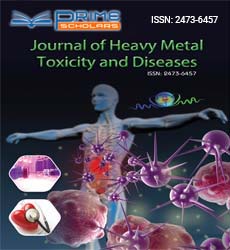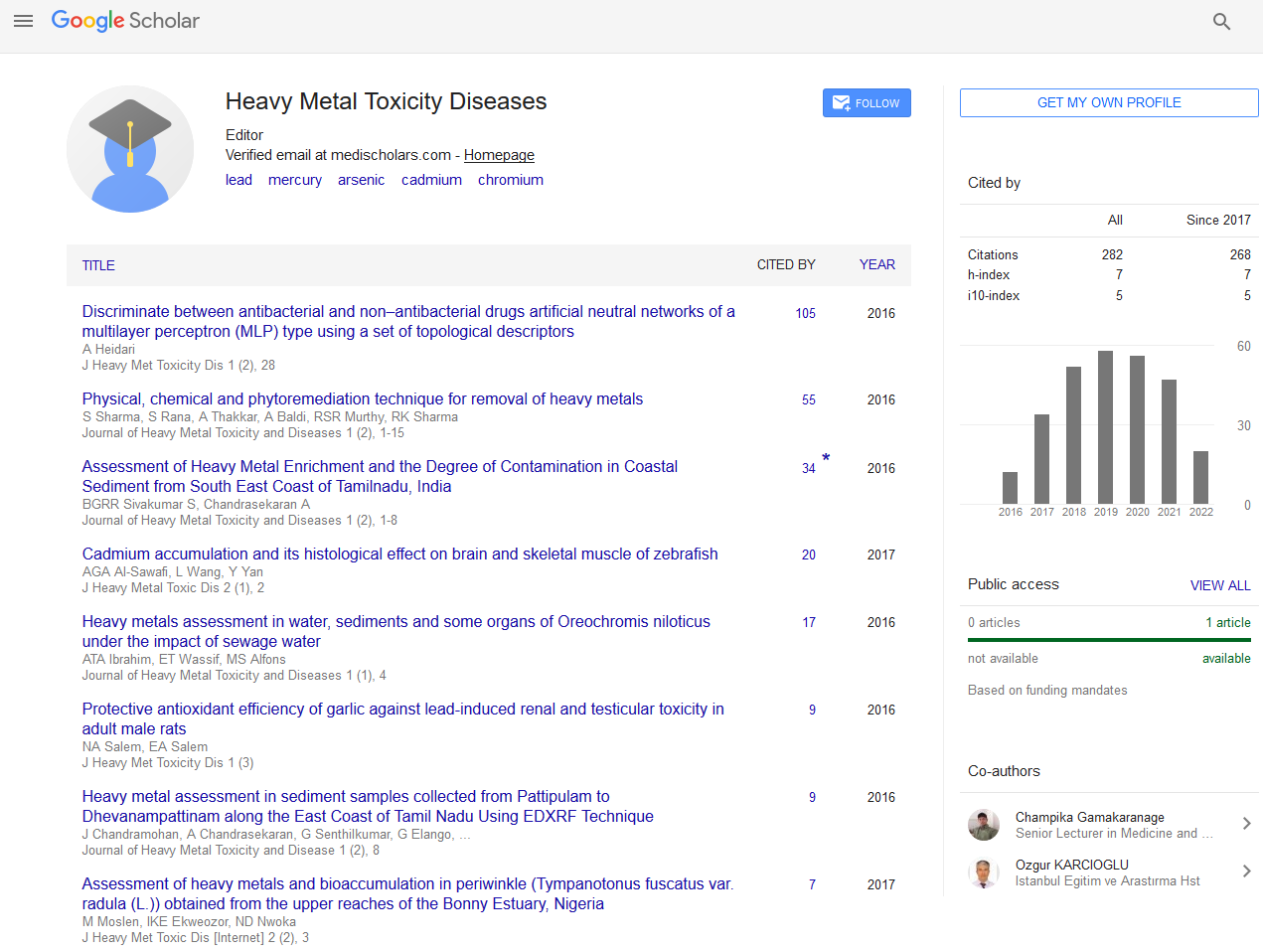Perspective - (2023) Volume 8, Issue 4
Ayurvedic Treatment for Heavy Metal Poisoning: A Natural Approach to Detoxification
Ibrahim Ahmed*
Department of Pharmacognosy, Assiut University, Egypt
*Correspondence:
Ibrahim Ahmed,
Department of Pharmacognosy, Assiut University,
Egypt,
Email:
Received: 01-Aug-2023, Manuscript No. ipjhmct-23-17815;
Editor assigned: 03-Aug-2023, Pre QC No. ipjhmct-23-17815 (PQ);
Reviewed: 17-Aug-2023, QC No. ipjhmct-23-17815;
Revised: 22-Aug-2023, Manuscript No. ipjhmct-23-17815 (R);
Published:
29-Aug-2023, DOI: 10.21767/2473-6457.23.4.32
Introduction
Heavy metal poisoning is a serious health concern that can result
from the accumulation of toxic substances like lead, mercury,
cadmium, and arsenic in the body. These metals can enter our
systems through various sources, including contaminated water,
food, and industrial exposure. Conventional medicine offers
treatments like chelation therapy, which can have side effects.
However, Ayurveda, the ancient Indian system of medicine, provides
a natural and holistic approach to detoxifying the body and
addressing heavy metal poisoning.
Description
Heavy metals are naturally occurring elements that, when present
in excessive amounts in the body, can lead to a range of health
problems. Common sources of heavy metal exposure include
lead-based paints, contaminated seafood, industrial pollution,
and even certain herbal supplements. Over time, these metals
can accumulate in tissues and organs, causing symptoms such as
fatigue, cognitive impairment, gastrointestinal issues, and even
organ damage. Ayurveda, with its focus on balance and natural
healing, offers a comprehensive approach to treating heavy
metal poisoning. It recognizes the interconnectedness of mind,
body, and spirit and seeks to address the root causes of health
issues rather than just the symptoms. Ayurveda employs a set
of detoxification therapies collectively known as Panchakarma.
These therapies include procedures like Vamana (emesis), Virechana
(purgation), and Basti (enema), which help eliminate accumulated
toxins from the body. Panchakarma is customized to an
individual’s constitution (Prakriti) and the specific heavy metal involved.
Ayurveda places a strong emphasis on diet as a means of
promoting health and detoxification. In the case of heavy metal
poisoning, an Ayurvedic practitioner will recommend a diet tailored
to the individual’s dosha (body type) to support the body’s
natural detoxification processes. Bitter and astringent foods, such
as leafy greens, turmeric, and cilantro, are often recommended
for their detoxifying properties. Ayurvedic herbs like Triphala,
Neem, and Guduchi are known for their detoxifying properties
and can be used to aid in heavy metal detoxification. These herbs
help cleanse the blood, support liver function, and enhance the
body’s natural ability to eliminate toxins. Ayurveda promotes a
balanced lifestyle that includes regular exercise, stress management
techniques like yoga and meditation, and adequate sleep.
These lifestyle changes can strengthen the body’s immune system
and overall resilience, making it more capable of handling
heavy metal toxicity. Ayurveda also employs Rasayana therapies
to rejuvenate the body and enhance its natural healing abilities.
These therapies can help repair damaged tissues and organs,
which may be affected by heavy metal poisoning. Since Ayurveda
is highly individualized, it’s essential to consult with a qualified
Ayurvedic practitioner who can assess your specific condition,
determine your dosha, and create a personalized treatment plan.
Conclusion
Ayurveda offers a holistic and time-tested approach to addressing
heavy metal poisoning, focusing on detoxification, diet, herbs,
lifestyle changes, and individualized treatments. It aims not only
to alleviate symptoms but also to restore balance and harmony
to the body, mind, and spirit. While Ayurvedic treatments can be
effective in managing heavy metal poisoning, they should complement,
not replace, conventional medical advice and interventions.
Therefore, anyone facing heavy metal poisoning should
consult both Ayurvedic and allopathic healthcare professionals
to ensure the most comprehensive and safe treatment plan.
Citation: Ahmed I (2023) Ayurvedic Treatment for Heavy Metal Poisoning: A Natural Approach to Detoxification. J Heavy Met Toxicity Dis. 08:32.
Copyright: © 2023 Ahmed I. This is an open-access article distributed under the terms of the Creative Commons Attribution License, which permits unrestricted use, distribution, and reproduction in any medium, provided the original author and source are credited.

